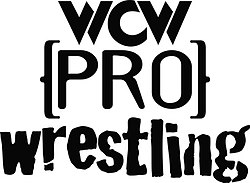WCW Pro
WCW Pro is a televised wrestling show that was presented by World Championship Wrestling (WCW). Along with WCW WorldWide, it was part of the WCW Disney tapings. The rights to WCW Pro now belong to WWE and 161 episodes of Mid-Atlantic Championship Wrestling are available for streaming on the WWE Network.[1]
| WCW Pro | |
|---|---|
 | |
| Created by | Jim Crockett Promotions / World Championship Wrestling |
| Starring | See World Championship Wrestling alumni |
| Country of origin | United States |
| Production | |
| Camera setup | Multicamera setup |
| Running time | 60 minutes per episode |
| Release | |
| Original network | Syndicated (1985–1994) TBS (1994–1998) |
| Picture format | 480i (SDTV) |
| Original release | January 11, 1958 – September 27, 1998 |
History
Mid-Atlantic Championship Wrestling (1958–1986)
WCW Pro started off as Mid-Atlantic Championship Wrestling,[2][3] one of two official weekly syndicated wrestling programs presented by Jim Crockett Promotions (the other was World Wide Wrestling, which in its final form was named WCW WorldWide). It started airing since 1958.[4][5]
NWA Pro Wrestling/WCW Pro Wrestling (1986–1994)
After the merger of JCP and Georgia Championship Wrestling in 1986, the show was renamed NWA Pro Wrestling. It was later renamed WCW Pro Wrestling in December 1990 after Turner Broadcasting bought JCP in 1988.
New York and Chicago (1990–1993)
In 1990, WCW Pro Wrestling was picked up by WPIX-TV in New York City and WGN-TV in Chicago. These two shows were localized versions of the show, with Tony Schiavone and veteran Chicago Cubs broadcaster Jack Brickhouse hosting WGN's WCW Pro Chicago, while Jim Ross and Paul E. Dangerously hosted WPIX's WCW Pro New York. These local versions featured the same matches as the national version of the show, with local spots inserted. In late-September 1991, the New York version moved to WCBS-TV where the show aired in a late-night Saturday slot. However, after only a few weeks, the local version was dropped and WCBS replaced it with the national version of the show. In April 1992, WCW Pro was replaced in New York altogether by WCW WorldWide, the show that WCW Pro New York replaced 2 years earlier on WPIX, which stayed on WCBS for the next five years. WCW Pro Chicago was simulcast on WGN's national feed due to the show's localization getting past the syndication exclusivity law. Sometime in 1991, Brickhouse would leave commentary on the Chicago version to host his own segment on the program, "Brickhouse Bonus." Larry Zbyszko took over Jack's old spot on commentary. WCW Pro Chicago would last until 1993.
WPXN later picked up WCW Pro for its lineup, airing the show from 1996 until its cancellation.
WCW Pro (1994–1998)
In 1994 the show, now available on very few local stations, was added to TBS on Saturday mornings in place of WCW's ill-fated WCW Power Hour on March 12, 1994. Some stations continued to air it in syndication, however. The show title also was shortened to simply WCW Pro.
In November 1995, WCW started taping WCW Pro at the Disney/MGM Studios (and later to Universal Studios Florida) as well. Starting August 25, 1996, the show moved from its established TBS timeslot of Saturday morning at 9:05am EST to Sunday afternoons at 5:05pm EST, where it remained until it was canceled by TBS and replaced by WCW Thunder in January 1998. Shortly afterwards the now syndication-only WCW Pro became a weekly highlights and recap show with one or two exclusive matches a week. Scott Hudson and Larry Zbyszko hosted the in-studio segments while Lee Marshall and Mike Tenay called the matches. TBS would continue to air Thunder and Saturday Night.
In late September 1998, WCW Pro was canceled.
Title changes
WCW Pro had two title changes.
- Ron Garvin and Barry Windham defeated Krusher Khrushchev and Ivan Koloff to win the NWA United States Tag Team Championship on December 13, 1986 (taped December 9, 1986)
- The Steiner Brothers (Rick Steiner and Scott Steiner) defeated The Fabulous Freebirds (Jimmy Garvin and Michael Hayes) to win the WCW World Tag Team Championship on March 9, 1991 (taped February 18, 1991).
References
- "UPDATED X3 WWE Network Adds More Mid-Atlantic TV From 1984 and 1985". 2 July 2018. Retrieved 3 July 2018.
- Mid-Atlantic Championship Wrestling
- No one did that better than the syndicated NWA Mid-Atlantic Championship Wrestling programs from the 1970s and 1980s, produced by Crockett Promotions out of Charlotte, North Carolina.
- Mid-Atlantic Championship Wrestling is the oldest syndicated program in the South and has appeared on WBTV (Channel 3) since 1958.
- "Wrestling Legends - Wrestling History - Crockett Foundation". Crockett Foundation - Tag In & Help Out!. Retrieved 2020-06-15.